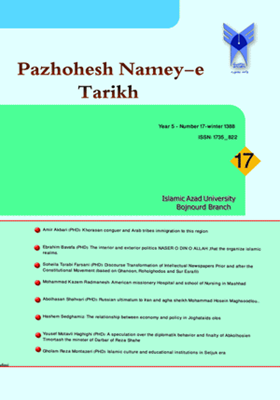Discourse Transformation of Intellectual Newspapers Prior and after the Constitutional Movement (Based on Ghanoon, Roholghodos and Sur Esrafil)
Subject Areas : Epistemological and methodological researcher of historical research
1 - استادیار گروه تاریخ
دانشگاه آزاد اسلامی واحد نجفآباد
Keywords: : Intellectuals, Seeking progress, Sur-i Esrafil, Ghanoon, Ruh ol’Ghodos,
Abstract :
Long before the victory of the constitutional revolution, in the aftermath of sending the first groups of Iranian students to Europe and as a result of their acquaintance with foundations and basic concepts of modern thought, Iranian intellectual movement came into being. One of the devices to propagate modern ideas into Iran by these intellectuals was to publish newspapers. "Ghanoon", a newspaper published by Mirza Malkam Khan in London represented an important section of the intellectuals, and Iranian thinkers inside Iran were greatly influenced by ideas published in it. Mirza Malkom Khan, through the pages of "Ghanoon", propagated reform and development in the country's socio-economic and political structures based on a kind of limited and monitored liberalism. After the victory of the constitutional revolution an influential radical newspaper called "Sur-i Esrafil" was published by Mirza Jahangir Khan Sur-i Esrafil and Mirza Ali Akbar Khan Dehkhoda which represented the radical intellectuals. " Sur-i Esrafil", on one hand, believed in liberal political rights, and on the other hand, propagated a socialist program of economic justice. These radical intellectuals were mainly people of the middle class origin who believed in democratic radicalism. But, at the same time the constitutional revolution made it possible for a zealous ultra-radical group to enter the political spectrum, who did not have any relations with the modern intellectual movement and believed in the traditional Islamic egalitarianism. "Ruh ol' Qodos" published by Sheikh Ahmad Torbati, otherwise called Soltan ol'Olama Khorasani propagated the ideas of this group of egalitarian constitutionalists who wanted to gain justice from constitutionalism. What they perceived from justice was not just socio-economic and political structures, but only just actions and deeds performed by a just person

